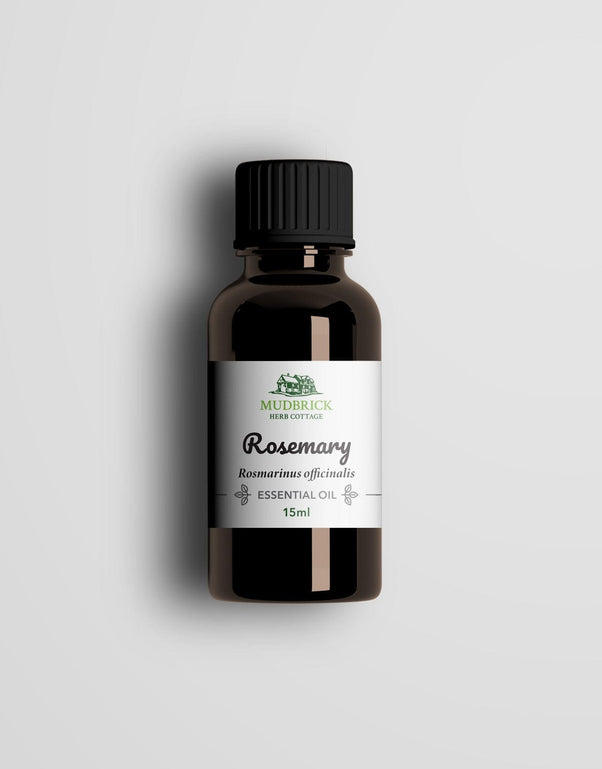Health Benefits of Rosemary Essential Oil

Rosemary essential oil has a rich history, even considered sacred among the ancient Egyptians, Hebrews, Greeks, and Romans. And in today’s modern world, the benefits of this oil are still alive & strong.
Distilled from the Rosemary herb (Rosmarinus officinalis L) and commonly referred to as the “dew of the sea,” this Mediterranean plant has been a staple of holistic & Ayurvedic medicine for centuries. But before the essential oil was adapted to help balance moods, naturally relieve pain, and promote hair growth, it was used to ward off evil spirits and burned as incense.
Hopefully, you don’t need to ward off any evil spirits in your life. But you can still reap the many benefits of rosemary essential oil in your everyday life. From antiseptic & anti-inflammatory properties to energy boosts, we’ll cover everything you need to know about this aromatherapy oil, including its active components and how to use it effectively.
The Basics of Rosemary Essential Oil (EO)
Rosemary EO is extracted via steam distillation, a process where the rosemary plant is treated with hot steam and the plant compounds are collected for use. Once distilled, the oil has a similar consistency to water. It’s typically a pale yellow in appearance, although some can appear colourless. The fragrance is a fresh, wood and herby mixture that’s fairly strong on the senses.

Active Compounds in Rosemary Essential Oil
There are a number of compounds found in rosemary oil, all of which contribute to the herb’s natural therapeutic properties.
These include:
- 1,8-cineole – also known as eucalyptol, it’s known to have anti-inflammatory & pharmacological properties
-
Camphor – a decongestant that strengthens immune health and helps treat common colds and flu symptoms
- Α-pinene – an anti-inflammatory & expectorant agent, which helps clear mucus from the airways
-
Rosmarinic acid – a powerful antioxidant & anti-inflammatory, and has even been used to prevent and inhibit tumours, as well as mitigate the effects of certain medical drugs
- Carnosic acid – helps improve cognitive function & mitochondrial health, and clinical studies have shown that it may also have obesity & gluten intolerance applications
These are the primary constituents, although studies found there are 29 total chemical components found in rosemary oil.
Health Benefits of Rosemary Essential Oil
We’ve hinted at a few of the health benefits of rosemary essential oil, but let’s explore them further. If you’ve considered stepping into the world of essential oils, rosemary is an excellent one to start with.
Cognitive Enhancement
Rosemary oil is considered one of the best essential oils for improving memory and concentration. It’s even shown promise in treating degenerative memory conditions like Alzheihemer’s disease.
The aroma of rosemary is considered to be highly effective in helping to improve memory and cognitive function. For example, one study had 28 older adults consume a low dose of dried rosemary powder. The results suggest that it’s an effective non-pharmacological therapy for dementia & Alzheimer’s, improving both the memory & speed of memory.
Hair Growth
If you’re looking to thicken and grow your hair, rosemary oil is often considered to be among the best natural solutions, especially compared to synthetic, store-bought products. Rosemary oil stimulates blood flow to the hair follicles, which helps promote hair growth. With its natural anti-inflammatory and antimicrobial properties, it also helps reduce irritation and flaking of the scalp.
Certain conditions like dandruff, for example, can be aided with the use of rosemary oil. For hair loss, a study done in 2012, found that men suffering from hair loss who used diluted rosemary oil, massaged into the scalp twice a day for six months, found a noticeable increase in hair thickness.
The study itself contributes to the positive influences that the oil has, especially for those who may suffer from Androgenetic Alopecia. The reduction of itchiness in the scalp, helps individuals to avoid scratching and damaging their hair follicles which are busy trying to create new strands of hair.
Natural Pain Relief
Pain relief is a part of everyday life, unfortunately. But pain-relieving medicines like ibuprofen or paracetamol shouldn’t be. Rosemary oil has both analgesic and anti-inflammatory properties, which can provide natural, effective pain relief.
While more research is needed on the oil’s impact on inflammation, there is preliminary evidence that suggests rosemary oil helps to reduce tissue inflammation that leads to pain, swelling, and stiffness.
That can be beneficial for some conditions like rheumatoid arthritis. A study was done on those with rheumatoid arthritis; they were given 15-minute knee massages three times per week using a rosemary oil blend. They experienced a 50% decrease in inflammatory knee pain in just two weeks.
Antimicrobial Effects
As mentioned already, rosemary essential oil has antimicrobial properties that are effective in preventing and treating infections. It can help lower the risk of infections and may help in fighting off infections that have already entered your immune system.
According to one study, the stimulatory effect of rosemary and its active compounds on the immune system showcase its potential as an effective aid for the body. However, further studies and research are needed to confirm.
Using Rosemary Essential Oil
You can only experience the full range of benefits of rosemary essential oil if used properly. With a variety of application methods and safety precautions, it’s not as simple as rubbing it where it hurts.
For cognitive enhancement & general mood improvements, we recommend inhaling the oil. Add a few drops to your diffuser or inhale directly from the bottle to treat yourself to a healing aromatherapy session.
For hair growth & pain relief, topical application is your best bet. Add 1-2 drops of the oil to a carrier oil, like jojoba oil, then massage onto the problem area. If you have sensitive skin, or it’s your first time using rosemary oil, try patch testing on a small area of skin to limit any potential discomfort.
Do the same when it comes to using it as a hair mask or for stimulating hair growth. Combine it with a carrier oil, then massage directly onto your scalp. You could even add 1-2 drops to your all-natural shampoo, which can be as effective.
How Can Rosemary Essential Help You on a Daily Basis?
Though you may not need to improve your memory or relieve pain on a daily basis, there are plenty of ways to use rosemary essential oil on a daily basis. Here are a few ideas:
- Use it to inhale and reduce feelings of anxiety.
- Aid sudden aches and pains.
- Use it as a spray for your hair to stimulate hair growth.
- Mix it in with your serums and moisturisers for your skincare routine.
- Add a few drops to a spray water bottle to create a non-toxic disinfectant.
Rosemary certainly has plenty of benefits that you can enjoy in your day-to-day life, whether that’s to help with your skincare, your internal systems, and any surface aches or pains.
Precautions & Potential Side Effects
For topical application, it’s important to do a patch test in order to test your skin’s sensitivity. While it might be ok for most, it might have an adverse reaction for some.
When it comes to dosage, rosemary oil is often consumed and applied in different ways. We never recommend ingesting any type of essential oil, as these potent compounds can have potentially fatal effects. If applying it to your hair & scalp, dilute several drops with a carrier oil or your shampoo.
As with anything you’re trying for the first time, it’s important to speak to your healthcare professional for advice. They’ll be able to recommend what dosage and uses the rosemary oil can be used for in your case.
We’ve learned a lot about rosemary essential oil, especially the benefits that it can offer, like cognitive enhancement, hair growth, natural pain relief, and antimicrobial effects. This potent and delicious-smelling essential oil is highly popular across the world, especially among Ayurvedic & holistic lifestyles.



